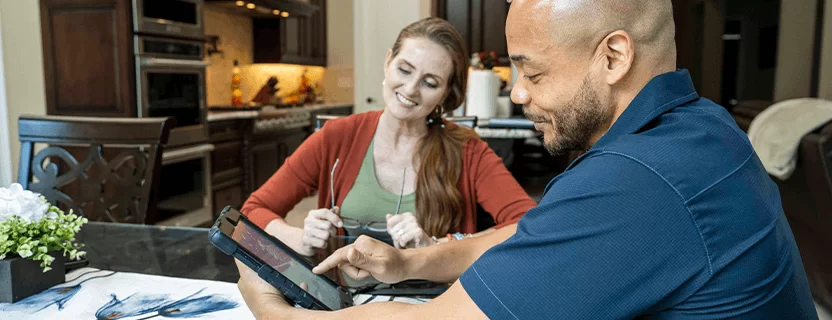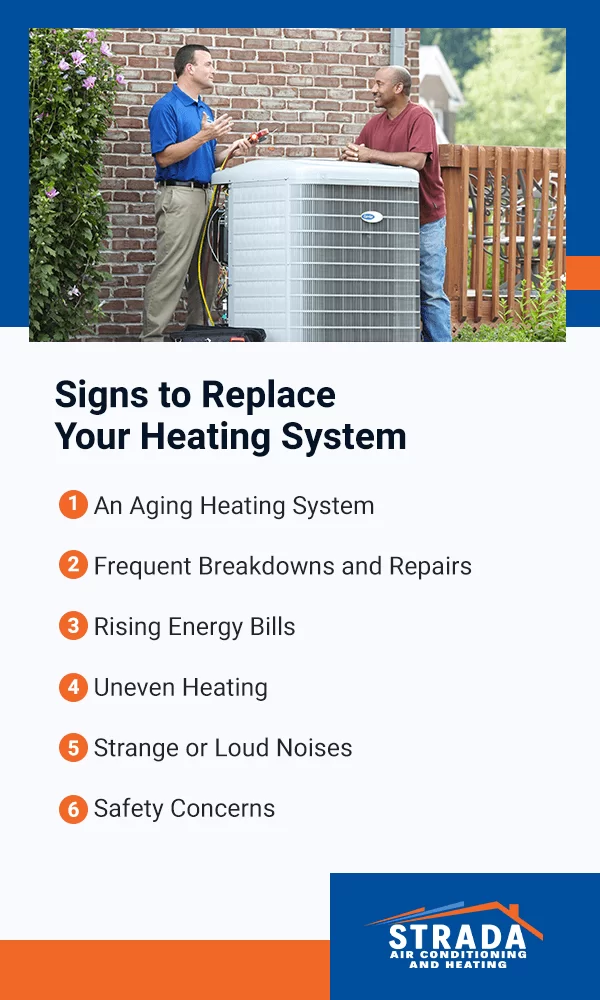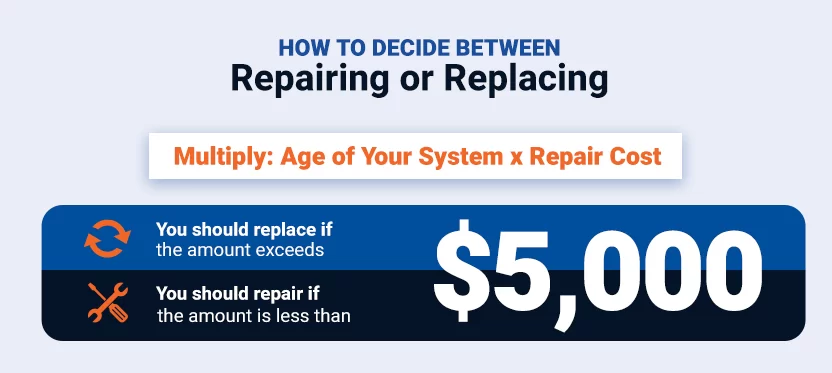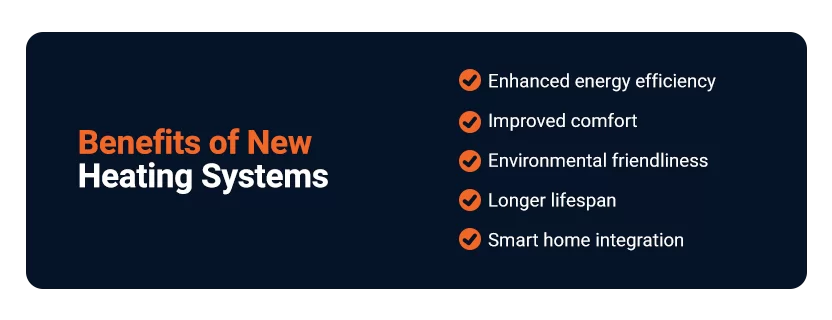
A heating system is vital for keeping your home warm and comfortable, especially during the cold season. When your furnace or heat pump starts giving you trouble, deciding whether to repair or replace it can be challenging. The choice is not always straightforward since it involves balancing the immediate costs of repair with the long-term benefits of a newer, more efficient model.
As part of your decision, you must consider factors such as energy efficiency, the age of your current system, the frequency and cost of repairs, and your comfort needs. This guide will explore the critical considerations you have to make to help you determine whether repairing your existing system is a viable option or if investing in a replacement is a more sensible choice for your home and budget.
Your heating system will give warning signs when something is wrong, whether it’s a loud bang coming from the unit or a noticeable increase in energy bills. However, it’s not always clear whether the problem calls for a quick fix or a total replacement. Understanding the key indicators of a failing heating system can help you avoid costly breakdowns and keep your home comfortable throughout the colder months.

Here are a few signs to pay attention to as you decide when to replace your heating system.
As a heating system ages, its efficiency and performance decline, which often leads to higher energy bills and more frequent repair needs. Heating systems typically last anywhere from 10 to 20 years, depending on the type, installation and maintenance, among other factors. According to ENERGY STAR, it’s best to replace heat pumps when they exceed 10 years, while furnaces and boilers can last 15 years before replacement.
Older systems often lack modern energy-saving features and struggle to maintain consistent temperatures. They may also pose safety risks due to potential carbon monoxide leaks or other malfunctions. While repairs can extend your heating system’s lifespan, the long-term cost savings and improved performance of a new, energy-efficient model often make replacement the more sensible choice.
Is your heating system regularly breaking down or giving you trouble? If you’re calling for service often, the costs can quickly add up to outweigh the benefits of repairing a heating system. When a heater constantly requires fixing, it signals underlying problems that are likely to worsen over time. It will eventually make more sense to invest in a new, more reliable heating system.
Rising energy bills can be a significant indicator that your heating system needs to be replaced, especially if your usage patterns haven’t changed. Aging or poorly maintained systems tend to use more energy to maintain the same level of warmth. Older models generally have lower efficiency compared to newer systems. For example, the efficiencies for older boilers and furnaces range between 56% and 70%, while modern systems can achieve ratings as high as 98.5%.
Malfunctioning or poorly maintained systems can contribute to inefficiency in several ways, from worn-out components to reduced insulation effectiveness. These issues translate to higher monthly bills. To save costs in the long run, you should replace your heating system.
One of the other heating system replacement signs to look for is uneven warmth throughout your home. Some rooms might feel noticeably colder than others, even when you set the thermostat at a comfortable temperature.
Uneven heating can be caused by various problems that indicate a decline in your system’s overall performance. One primary cause is blocked or improperly installed air vents and ducts. Restricted airflow will prevent warm air from circulating evenly throughout the home. An undersized system can also fail to generate enough power to heat the different rooms in your house. While some issues can be resolved with repairs, persistent uneven heating often signals a bigger problem where replacement might be necessary.
Have you heard strange noises coming from your heating system? Besides the usual on-and-off sound and everyday operational hums, some noises are cause for concern. Here are some of the unusual noises your heating system might make that could signify a serious problem:
One of the main reasons to replace your heating system is if it threatens your safety. If your gas or oil system has a damaged combustion chamber or cracked heat exchanger, it can cause a carbon monoxide (CO) leak in your home. CO poisoning is deadly, claiming more than 400 lives in the U.S. every year.
If you suspect that your heating system is producing carbon monoxide, you should get it replaced immediately to keep yourself and your family safe.
Cost is often the deciding factor in the choice between heating system repair vs. replacement. Conducting a cost-benefit analysis is the best way to weigh the financial implications of each option. It involves carefully evaluating factors like repair costs, energy efficiency and long-term savings, so you can make an informed decision that fits your budget and comfort needs.
When deciding between repairing or replacing your heating system, you need to consider the costs of repairs. The HVAC industry uses the $5,000 rule of thumb to help homeowners make an informed financial decision.
To determine whether repairs or replacement is the right choice, multiply the age of your system by the repair cost. If the amount exceeds $5,000, you should replace your heating system. A repair should be fine if the amount is less than $5,000 and your unit is otherwise performing well and not nearing the end of its lifespan.
With an aging system, even a seemingly minor repair could be a temporary fix on a system that’s likely to fail again soon. A newer unit that requires frequent fixes could mean that you’re dealing with hidden issues that can become more severe, resulting in accumulated repair costs.

A comprehensive assessment of long-term expenses is crucial in determining whether to repair or replace your heating system. Long-term expenses extend far beyond the initial repair or installation cost.
With older systems, you’re likely to face increasing costs. The primary concern is usually energy bills — aging systems operate at lower efficiency levels and consume more fuel to maintain the same comfort. As a result, you end up with higher monthly costs.
Repair costs also tend to escalate as your unit ages. Parts may become harder to find, and more frequent breakdowns can do a number on your wallet.
If you’re considering a heating system replacement, you need to think about the expenses related to a new installation to make sure it fits your budget. The overall cost of a new unit can vary depending on several factors, including:
By carefully evaluating all these factors, you can arrive at a realistic estimate of the total cost of a new heating system.
Tax incentives and rebates for new, energy-efficient heating systems can significantly reduce the upfront cost and make replacement a more attractive option. Government agencies, utility companies and manufacturers often offer incentives to encourage homeowners to invest in high-efficiency equipment. For example, homeowners can get a federal tax credit of up to $2,000 for upgrading to heat pump technology.
When thinking about replacing your heating system, it’s a good idea to research available tax credits, rebates and financing options so you can focus on models that come with incentives. In addition to helping you offset the initial amount, these systems offer excellent energy efficiency, which will help you save costs in the long run.
While a replacement might be more expensive than repairs, a new system can offer potential long-term savings. One primary source of savings is improved efficiency. Newer models are designed to run more efficiently, helping you lower your monthly utility bills. You can calculate the annual energy savings by comparing the energy rating of your old system with the new, high-efficiency model. Use your past energy bills to estimate current heating costs and project the savings based on the efficiency improvement.
Another area where you might see savings is reduced repair costs. A new heating system is less likely to require frequent repairs, so you can save on parts and labor.

Repairing your aging system and hoping it gets you through the winter can be tempting, especially if you’re on a budget. On the other hand, upgrading to a newer, more efficient model can be a better choice despite the substantial initial investment. That’s because newer heating systems offer several benefits, such as:
Whether you need to repair or replace your heating system, Strada Air Conditioning & Heating can help keep your space warm and cozy. Our expert team is ready to examine your heating unit to determine the best course of action between repair and replacement.
We are skilled at all kinds of heating repairs and can restore your system’s functionality quickly. For replacements, our technicians can help you choose a system that fits your space and comfort needs. We offer an optional 10-year warranty for new heating systems to give you extra peace of mind.
Since 2003, we have been committed to delivering exceptional service and top-notch equipment to homeowners throughout the Southeastern United States. Contact us or schedule your appointment online today!
